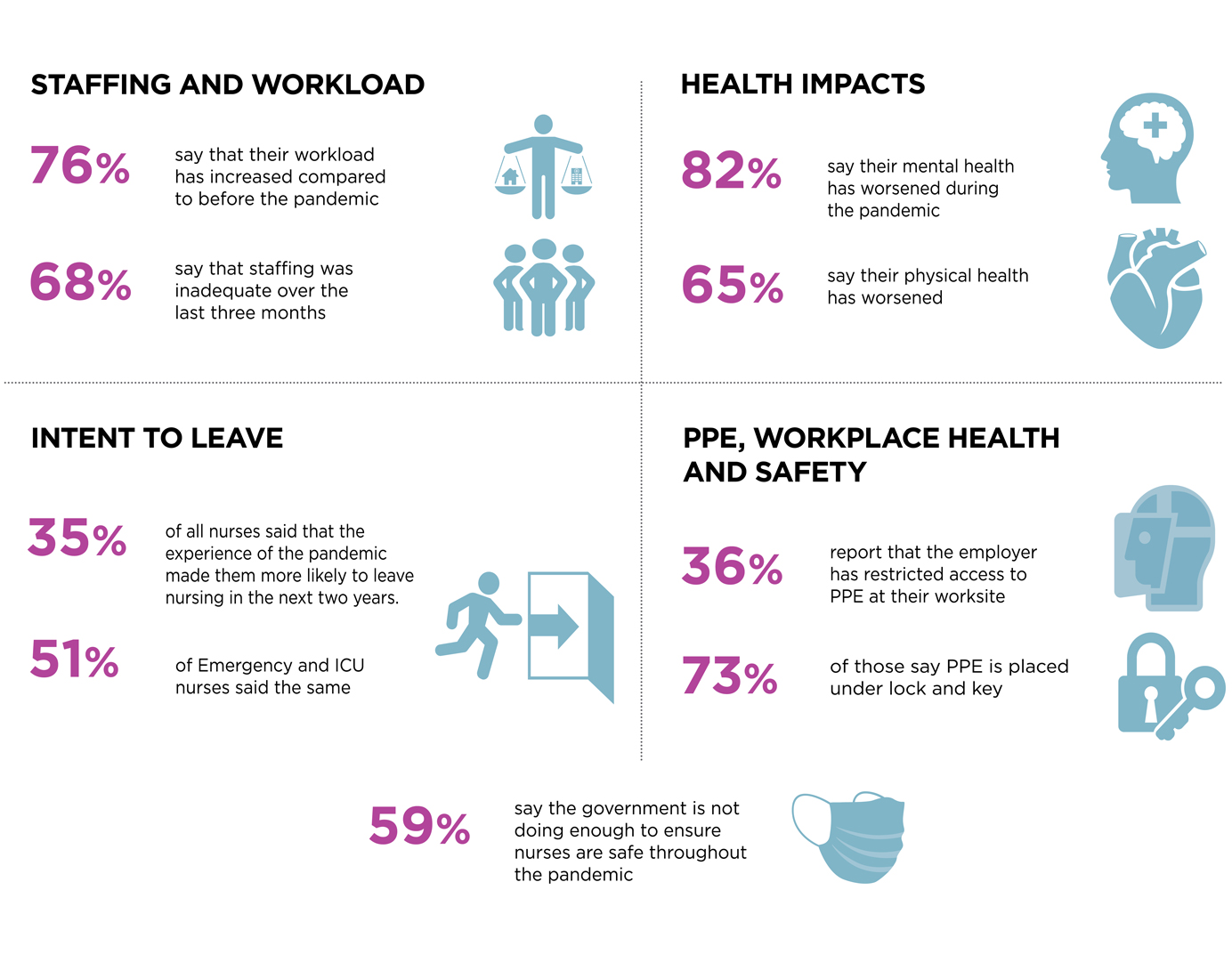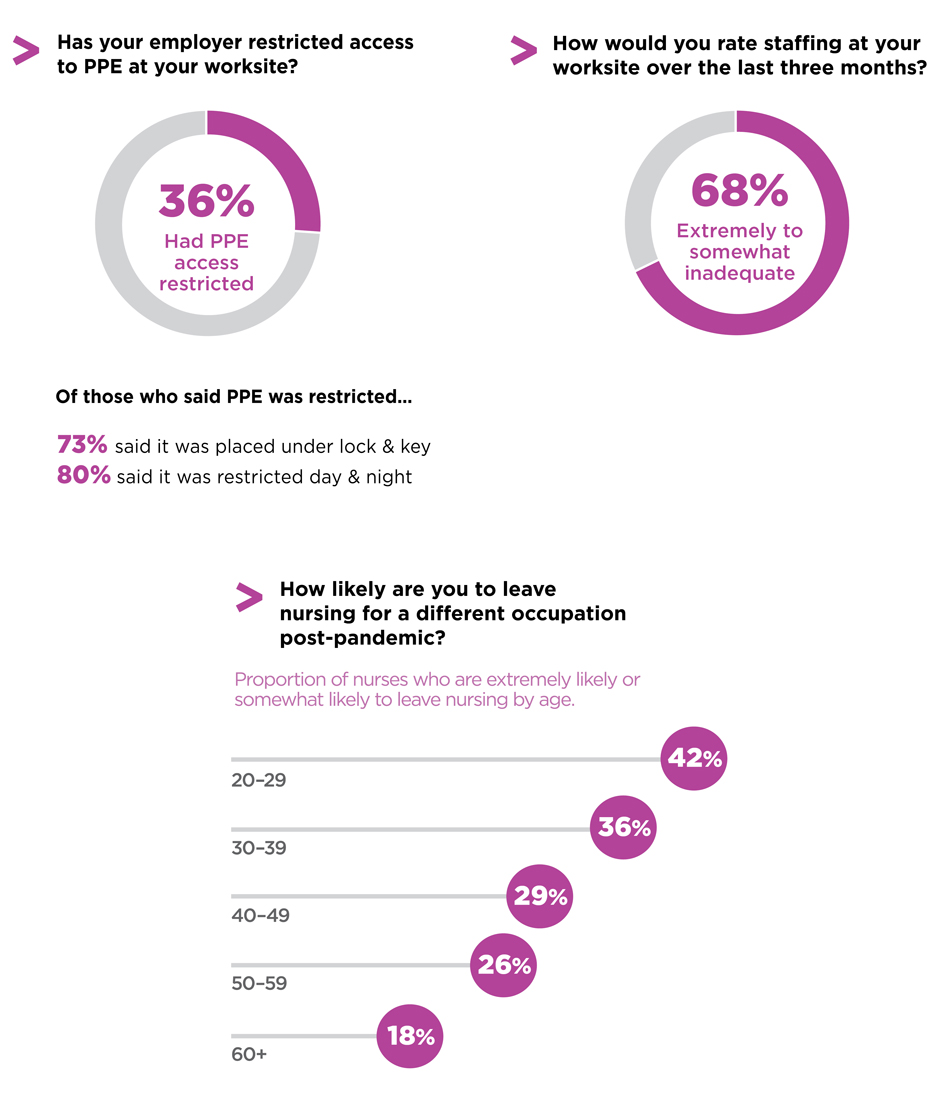 What Does the Future Hold?
What Does the Future Hold?

New report shines a light on the negative health impacts nurses have endured throughout the COVID-19 pandemic
The ongoing COVID-19 pandemic has dramatically highlighted the serious shortcomings of British Columbia's health-care system. These include a chronic nursing shortage that has existed for years and increasingly difficult working conditions that thousands of nurses across the province continue to endure.
New research conducted by the BC Nurses' Union during the height of COVID-19's third wave reveals the full extent of the mental and physical toll the pandemic has taken on members. The union's recently published report, TheFuture of Nursing in BC, summarizes the survey responses of some 3,500 nurses who participated in the research.
The report findings, which include first-hand accounts from BCNU members in all sectors of the health-care system, offer sobering insights into the reality of working nurses' lives.
Sadly, few if any of the findings are surprising.
"Members told us they were at a breaking point well before the onset of the COVID-19 pandemic, and for far too long nurses have been sacrificing their own well-being to deliver the level of care British Columbian's deserve," says BCNU President Aman Grewal.
From amplified levels of moral distress to hindered recruitment and retention efforts within the profession, she says there are worsening concerns that the multiple systemic issues stemming from the nurse staffing crisis are having a lasting impact on the delivery of patient care.
Two-thirds of survey respondents reported experiencing a high amount of stress at work during the pandemic, and only five percent of nurses said their work-life balance had not been affected.
"We hope the public gains an accurate understanding of what nurses have endured."
"It's unrealistic to think that nurses haven't had their entire lives turned upside down by the pandemic," remarks Grewal. "Many have isolated themselves from their friends and family in fear of unknowingly transmitting COVID-19 to their loved ones."
Grewal says she is especially concerned by the growing number of nurses who are considering leaving the profession they once loved, and notes that 35 percent of survey respondents said the experience of the pandemic has made them more likely to leave nursing. She's even more troubled by survey results showing that younger nurses more often report that the pandemic has made them more likely to leave their specialty, or leave nursing altogether. "This finding is important," she stresses, "because provincial planning for staffing in health care assumes that nurses will stay in the profession. If younger nurses leave, we won't have enough new students to replace them."
The survey also focused on nurses' access to personal protective equipment (PPE) and workplace safety precautions.
One in seven nurses reported being denied access to PPE when they requested it. N95 respirator masks were the items most commonly denied by employers, followed by face shields, surgical masks, gowns, gloves, goggles, and other necessary items. Nurses also described being directed to re-use their PPE and being provided with low-quality items such as surgical masks with chemical smells or gloves that tear.
Results like these have BCNU repeating its demand that health employers provide nurses with unfettered access to PPE. "Asking nurses to stand on the front lines of the pandemic without proper PPE, is akin to sending soldiers into battle without helmets," argues Grewal, who notes that public health authorities' unwillingness to recognize of COVID-19's aerosol transmission prevented the proper distribution of PPE and implementation of important infection control measures.
BOLD ACTION NEEDED
The findings in the report also serve as a call to action for health employers and the provincial government.
"The results of the survey give us irrefutable evidence that BC's nurses aren't receiving the supports they need," states Grewal, who adds that it is critical that the government take action now to improve working conditions for nurses in all health-care settings across the province, whether in long-term care, acute care or community care.
"Without bold leadership and significant investments, the health-care system will continue to struggle to retain the educated nursing professionals who are the backbone of our health-care system and who provide the care British Columbians need."
The report's publication also serves to better engage the general public, who deserve to know exactly how their health-care system is struggling. And it provides patients, residents and their families with an opportunity to raise their own voice in support of nurses.
"Nurses are helping British Columbians weather the COVID-19 pandemic, and by sharing the findings in this report, we hope the public gains an accurate understanding of what nurses have needlessly endured," says Grewal.
She acknowledges that there are no quick or easy solutions to the issues faced by nurses and our health-care system, but says it's clear that providing nurses with the supports they need to maintain their practice standards should be a top priority for health employers and government who have the power to make the changes necessary to ensure the sustainability of the health-care workforce.
"A healthy future requires investing in more nurses, and we insist that the government provide short and long-term solutions that focus on the health of the system as a whole," says Grewal. "As the pandemic wears on, we are asking that a plan be developed that addresses the crippling staffing shortage, unrealistic working conditions, and recruitment and retention of nurses in every part of this province."
Grewal says BCNU members are ready to collaborate on finding solutions, and points to survey results showing that nurses are more willing to stay in the profession if they are better protected from violence in the workplace, if they have unfettered access to PPE and have enough nursing colleagues to meet the demands of the health-care system. "Nurses are telling us what they need. Now the government and health employers need to listen," she argues.
"It's time for swift action to support the dedicated nurses and health-care workers who are providing world-class care every single day," says Grewal, "whether it's in a global pandemic, or in years to come."
KEY FINDINGS
BCNU conducted a survey of members in May 2021 amid the strain COVID-19's third wave. Nearly 3,500 responses were received over a two-week period.
The survey sought to better understand the mental and physical toll the pandemic continues to have on the tens of thousands of nurses providing direct patient care in the province.
The questions focused primarily on nurses' workplace health and safety, staffing and workload, workplace violence, nurses' intent to stay in the profession and the health impacts of current working conditions.


UPDATE (Winter 2021)

